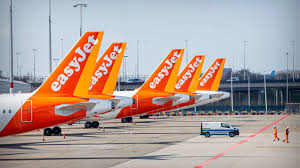
LONDON: easyJet Plc has agreed with Airbus the deferral of aircraft from Financial Years 2022, 2023 and 2024.
A total of 22 aircraft will be moved from FY2022-FY2024 to FY2027-FY2028. In addition, there will be movement of 15 delivery dates within the period FY2022-FY2024 to more closely match forecast seasonal requirements.
As communicated previously, all aircraft purchased by easyJet under the terms of the original 2013 Airbus agreement are subject to a discount from list price, which remains unchanged.
Within the 2013 agreement a price escalation mechanism is used to reflect market inflation in labour and material costs1 and as such the future aggregate cash price of the aircraft subject to deferrals will increase.
The changes also result in a re-phasing of the pre-delivery payment cash flows of the orderbook due to the later dates of delivery.
As previously disclosed easyJet had the option until 31 December 2020 not to take up to seven aircraft scheduled for delivery between FY2022 and FY2026. easyJet has now agreed with Airbus to reallocate the aircraft to which this option applies, to seven aircraft due for delivery in FY2025-FY2026, with the deadline to exercise this option amended to December 2021.
These changes will result in easyJet taking no deliveries in FY2021, 8 deliveries in FY2022, 7 deliveries in FY2023 and 18 deliveries in FY2024, with no change to the total number of firm Airbus A320 NEO family aircraft outstanding orders.
easyJet has retained options to increase its deliveries in FY2023 to 30 aircraft, reflecting an acceleration of deliveries from future financial years. This option to accelerate is subject to Airbus’ normal commercial and industrial constraints and is exercisable by 31 December 2021.
Johan Lundgren, easyJet CEO said: “This latest amendment to our longstanding agreement with Airbus reflects easyJet’s significant fleet flexibility as well as the benefit of highly attractive aircraft pricing. In this period of uncertainty, this flexibility is even more valuable, as it will enable us to quickly flex our fleet size in response to customer demand.
easyJet’s unrivalled European network of number 1 and 2 positions in primary airports, strong liquidity and flexibility will enable us to capture pent-up demand as customers return to the skies.”
Leave a Reply